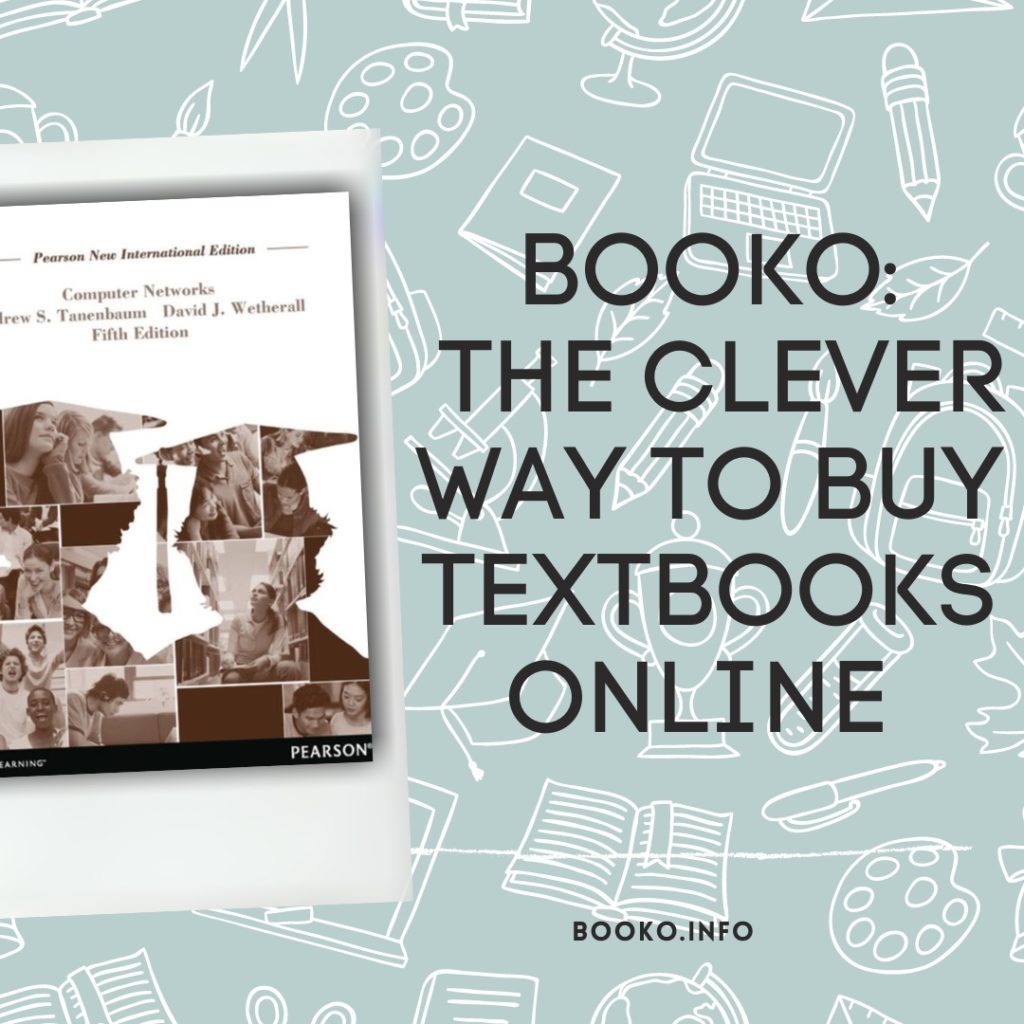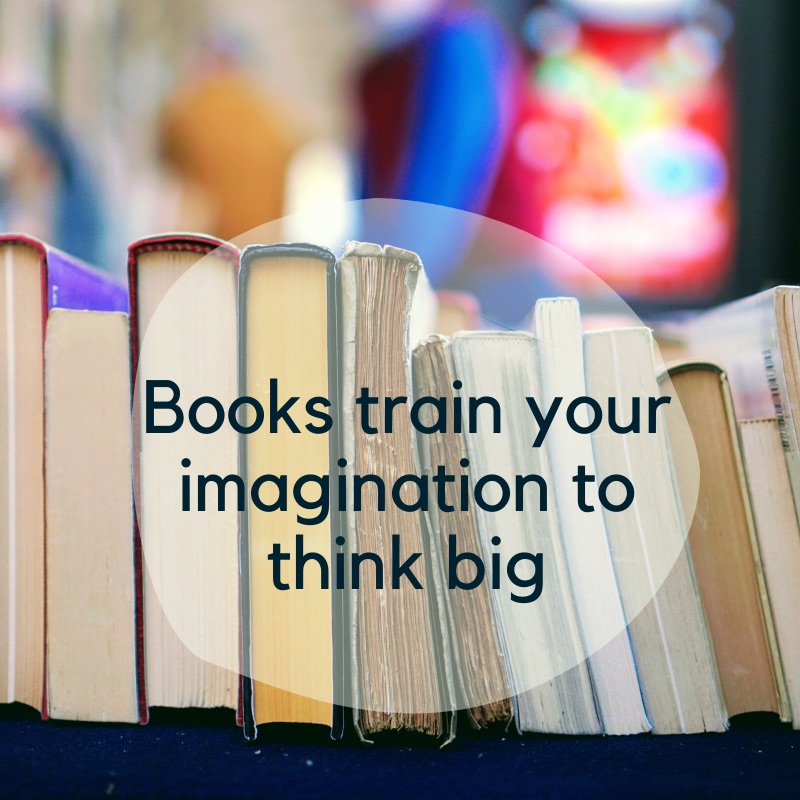Reading and writing can be acts of courage that bring us closer to others and ourselves. In this Ted Talk author Michelle Kuo shares how teaching reading skills to her students in the Mississippi Delta revealed the bridging power of the written word as well as the limitations of its power.
Category Archives: Books of the World
Booko: The clever way to buy textbooks online – Computer Networks
Heading back to uni and have a textbook list as long as your arm? Pop the ISBN into Booko and load up your cart the clever way.
Today’s clever pick is Computer Networks.

Monday Inspo
Spotlight on : Sir David Attenborough
Sir David Attenborough has been observing this world closely for over 60 years and has a few words of advice and caution for us. In his latest special on Netflix he shares how steeply the planet’s biodiversity has diminished over his lifetime. His work throughout his career has uncovered amazing species that we would never ordinarily be aware of or see and so today we are sharing a small fraction of his amazing work.
Find a spot to sit with a cup of tea, and clear the diary for the afternoon as we’re sure these books will inspire you to explore our wonderful world more…
A Life on Our Planet; My Witness Statement and Vision for the Future by David Attenborough
Hands down this is one the best books of the year. See the world. Then make it better. David Attenborough is currently 93 years old and has had an extraordinary life. It’s now, on reflection of his life, that he can appreciate how extraordinary and fragile the world is. The tragedy of our time has been happening all around us, barely noticeable from day to day; the loss of our planet’s wild places, its biodiversity. Attenborough has been witness to this decline. A Life on Our Planet contains his witness statement, and his vision for the future, the story of how we came to make this, our greatest mistake, and how, if we act now, we can yet put it right. We have the opportunity to create the perfect home for ourselves and restore the wonderful world we inherited. All we need is the will to do so.
Adventures of a Young Naturalist; Sir David Attenborough’s Zoo Quest Expeditions by David Attenborough
In 1954, a young television presenter was offered the opportunity of a lifetime, to travel the world finding rare and elusive animals for London Zoo’s collection, and to film the expeditions for the BBC. His name was David Attenborough, and the programme, Zoo Quest, not only heralded the start of a remarkable career in broadcasting, but it changed the way we viewed the natural world forever. Written with his trademark wit and charm, Zoo Quest is not just the story of a remarkable adventure, but of the man who made us fall in love with the natural world, and who is still doing so today.
Journeys to the Other Side of the World; Further Adventures Of A Young Naturalist by David Attenborough
Following the success of the original Zoo Quest expeditions, in the late 1950s onwards the young David Attenborough embarked on further travels in a very different part of the world.
From Madagascar and New Guinea to the Pacific Islands and the Northern Territory of Australia, he and his cameraman companion were aiming to record not just the wildlife, but the way of life of some of the indigenous people of these regions, whose traditions had never been encountered by most of the British public before.
From the land divers of Pentecost Island and the sing-sings of New Guinea, to a Royal Kava ceremony on Tonga and the ancient art of the Northern Territory, it is a journey like no other. Alongside these remarkable cultures he encounters paradise birds, chameleons, sifakas and many more animals in some of the most unique environments on the planet. Journeys to the Other Side fo the World is an inimitable adventure among people, places and the wildest of wildlife.
Life in Cold Blood by David Attenborough
Life in Cold Blood offers a rare glimpse into the peculiar world of amphibians and reptiles, the first vertebrate creatures to venture forth from the primeval waters millions of years ago, yet which today include species that are the most at risk of extinction. Join acclaimed naturalist Sir David Attenborough as he travels to the far corners of the Earth to tell the epic story of these animals in this companion to the television series. Discover the secrets of their astounding success and the profound implications of their uncertain future. Amphibians and reptiles once ruled the planet, and their descendants exhibit some of the most colourful variety and astounding behaviour known to the animal kingdom. What are the origins of these creatures? How have they transformed themselves into the beautiful and bizarre forms found today? In this gorgeously illustrated book, Attenborough gets up close and personal with the living descendants of the first vertebrates ever to colonise the land, and through them traces the fascinating history of their pioneering ancestors. He explains the ways amphibians and reptiles have changed little from their prehistoric forebears while also demonstrating how they have adapted and evolved into diverse new forms, some of them beyond our wildest imaginings. And Attenborough raises awareness of the threats global warming and other man-made environmental changes pose to many of these creatures.
Life on Earth by David Attenborough
Originally published in 1979, this is a new, fully updated edition of David Attenborough’s groundbreaking Life on Earth. David Attenborough’s unforgettable meeting with gorillas became an iconic moment for millions of television viewers. Life on Earth, the series and accompanying book, fundamentally changed the way we view and interact with the natural world setting a new benchmark of quality, influencing a generation of nature lovers.
Told through an examination of animal and plant life, this is an astonishing celebration of the evolution of life on earth, with a cast of characters drawn from the whole range of organisms that have ever lived on this planet. Attenborough’s perceptive, dynamic approach to the evolution of millions of species of living organisms takes the reader on an unforgettable journey of discovery from the very first spark of life to the blue and green wonder we know today.
Now, to celebrate the 40th anniversary of the book’s first publication, David Attenborough has revisited Life on Earth, completely updating and adding to the original text, taking account of modern scientific discoveries from around the globe. He has chosen beautiful, completely new photography, helping to illustrate the book in a much greater way than was possible forty years ago.
This special anniversary edition provides a fitting tribute to an enduring wildlife classic, destined to enthral the generation who saw it when first published and bring it alive for a whole new generation.
Life on Air by David Attenborough
There are very few places on the globe that David Attenborough has not visited. In this volume of memoirs David tells stories of the people and animals he has met and the places that he has visited. Sir David’s first job after Cambridge University and two years in the Royal Navy was at the London publishing house Hodder & Stoughton. Then in 1952 he joined the BBC as a trainee producer and it was while working on the Zoo Quest series from 1954-64 that he had his first opportunity to undertake expeditions to remote parts of the globe to capture intimate footage of rare wildlife in its natural habitat. He was Controller of BBC2 from 1965-68 during which time he introduced colour television to Britain, then Director of Programmes for the BBC from 1969-1972. However in 1973 he abandoned administration altogether to return to documentary-making and writing. Over the next 25 years he established himself as the world’s leading natural history programme maker with several landmark BBC series, including Life on Earth (1979), The Living Planet (1984), The Trials of Life (1990), The Private Life of Plants (1995) and Life of Birds (1998). Sir David Attenborough is a Trustee of the British Museum and the Royal Botanic Gardens, Kew: an Honorary Fellow of Clare College, Cambridge: a Fellow of the Royal Society and was knighted in 1985.
To see more of David Attenborough’s books please click here and for his DVDs click here.
Enjoy!
Lessons for Change
2020 has been a year like no other. Not only is the world suffering a deadly pandemic, racial tensions have been heightened, the environment continues to suffer and political leaders are vying for votes. Yikes. On reflection, it certainly has been a huge year.
Looking forward, we can take the lessons learned from 2020 and apply them into the future. It’s this thought that prompted us to look at lessons that have been learned from events that have happened in the past. We’ve found six great books that do just that. Sit back and get ready to be taken on a wild history ride.
What Happened by Hillary Clinton
‘In the past, for reasons I try to explain, I’ve often felt I had to be careful in public, like I was up on a wire without a net. Now I’m letting my guard down.’ – Hillary Rodham Clinton.
For the first time, Hillary Rodham Clinton reveals what she was thinking and feeling during one of the most controversial and unpredictable presidential elections in history. Now free from the constraints of running, Hillary takes you inside the intense personal experience of becoming the first woman nominated for president by a major party in an election marked by rage, sexism, exhilarating highs and infuriating lows, stranger-than-fiction twists, Russian interference and an opponent who broke all the rules. This is her most personal memoir yet. In these pages, she describes what it was like to run against Donald Trump, the mistakes she made, how she has coped with a shocking and devastating loss, and how she found the strength to pick herself back up afterwards. With humour and candour, she tells readers what it took to get back on her feet – the rituals, relationships and reading that got her through, and what the experience has taught her about life. She speaks about the challenges of being a strong woman in the public eye, the criticism over her voice, age and appearance, and the double standard confronting women in politics. She lays out how the 2016 election was marked by an unprecedented assault on democracy by a foreign adversary. By analysing the evidence and connecting the dots, Hillary shows just how dangerous the forces are that shaped the outcome, and why Americans need to understand them to protect their values and democracy in the future. The election of 2016 was unprecedented and historic. What Happened is the story of that campaign and its aftermath – both a deeply intimate account and a cautionary tale.
21 Lessons for the 21st Century by Yuval Noah Harari
We’ve highlighted this book on the blog before and believe it is important to include again. The Guardian newspaper credits Yuval Noah Harari with making serious non-fiction cool again. In his earlier books, the surprise bestsellers Sapiens and Homo Deus, he explained the history of humanity and the rise of civilisation in terms of evolutionary psychology. Now Yuval Noah Harari looks at the present. 21 Lessons for the 21st Century is a collection of essays about the big issues – AI and automation, Fake News and populism, religion, climate change – and how we can manage their impact on our lives. His talent at combining unexpected ideas into dazzling observations makes this a thought-provoking yet accessible read that helps us make sense of these uncertain times.
The Anarchy by William Dalrymple and Sid Sagar
In August 1765 the East India Company defeated and captured the young Mughal emperor and forced him to set up in his richest provinces a new government run by English traders who collected taxes through means of a vast and ruthless private army.
The creation of this new government marked the moment that the East India Company ceased to be a conventional international trading corporation, dealing in silks and spices, and became something much more unusual: an aggressive colonial power in the guise of a multinational business. In less than half a century it had trained up a private security force of around 260,000 men, twice the size of the British army, and had subdued an entire subcontinent, conquering first Bengal and finally, in 1803, the Mughal capital of Delhi itself. The Company’s reach stretched relentlessly until almost all of India south of the Himalayas was effectively ruled from a boardroom in London.
The Anarchy tells the remarkable story of how one of the world’s most magnificent empires disintegrated and came to be replaced by a dangerously unregulated private company, based thousands of miles overseas and answerable only to its shareholders. In his most ambitious and riveting book to date, William Dalrymple tells the story of the East India Company as it has never been told before, unfolding a timely cautionary tale of the first global corporate power.
Three hundred and fifteen years after its founding, with a corporate Mogul now sitting in the White House, the story of the East India Company has never been more current.
How Democracies Die by Steven Levitsky and Daniel Ziblatt
Democracies can die with a coup d’etat or they can die slowly. This happens most deceptively when in piecemeal fashion, with the election of an authoritarian leader, the abuse of governmental power and the complete repression of opposition. All three steps are being taken around the world and we must all understand how we can stop them. From the rule of General Augusto Pinochet in Chile to the quiet undermining of Turkey’s constitutional system by President Recip Erdogan, Harvard professors Steven Levitsky and Daniel Ziblatt draw insightful lessons from history to shine a light on regime breakdown across the 20th and 21st centuries. Based on years of research, they present a deep understanding of how and why democracies die; an alarming analysis of how democracy is being subverted today; and a guide for maintaining and repairing a threatened democracy, for governments, political parties and individuals. History doesn’t repeat itself. But we can protect our democracy by learning its lessons, before it’s too late.
48 Laws of Power by Robert Greene
Cunning, instructive, and amoral, this controversial bestseller distills 3,000 years of the history of power into 48 well-explicated laws. Law 1: Never Outshine the Master. Law 3: Conceal Your Intentions. Law 7: Get Others to Do the Work for You, but Always Take the Credit. Law 15: Crush Your Enemy Totally. Law 33: Discover Each Man’s Thumbscrew.
These are the laws of power in their unvarnished essence; the philosophies of Machiavelli (The Prince), Sun-tzu (The Art of War), Carl von Clausewitz, Talleyrand, the great seducer Casanova, con man Yellow Kid Weil, and other legendary thinkers and schemers. They teach prudence, stealth, mastery of one’s emotions, the art of deception, and the total absence of mercy. Like it or not, all have practical applications in real life.
Each law is illustrated with examples of observance or transgression drawn from history and featuring such famous figures as Queen Elizabeth I, Henry Kissinger, Mao, Alfred Hitchcock, P.T. Barnum, Haile Selassie, Catherine the Great, and Socrates. Convincing, practical, sometimes shocking, this book will fascinate anyone interested in gaining, observing, or defending against ultimate control.
Sisters in Law: How Sandra Day O’Connor and Ruth Bader Ginsburg Went to the Supreme Court and Changed the World by Linda Hirshman
The relationship between Sandra Day O’Connor and Ruth Bader Ginsburg, Republican and Democrat, Christian and Jew, western rancher’s daughter and Brooklyn girl, transcends party, religion, region, and culture. Strengthened by each other’s presence, these groundbreaking judges, the first and second to serve on the highest court in the land, have transformed the Constitution and America itself, making it a more equal place for all women. Linda Hirshman’s dual biography includes revealing stories of how these trailblazers fought for their own recognition in a male-dominated profession; battles that would ultimately benefit every American woman. She also makes clear how these two justices have shaped the legal framework of modern feminism, including employment discrimination, abortion, affirmative action, sexual harassment, and many other issues crucial to women’s lives. Sisters-in-Law combines legal detail with warm personal anecdotes that bring these very different women into focus as never before. Meticulously researched and compellingly told, it is an authoritative account of changing law and culture, and a moving story of a remarkable friendship.
Enjoy!
Build your bookshelf with Booko: Our Rainbow Queen
Our Rainbow Queen is a riotously colourful book taking us on a photographic journey through Queen Elizabeth II’s ten decades of colour-blocked style.

Build your bookshelf with Booko: The Other Side of the Coin
The Other Side of the Coin provides insights into what it’s like to work closely with The Queen, to curate her wardrobe and discover a true and lasting connection along the way.

Build your bookshelf with Booko: Skincare
Straight-talking advice from the Skincare Queen Caroline Hirons has been a favourite in bookseller lists around the globe. Skincare is hands down the best skincare guide.

Election Time
It’s been a year like no other with a devastating global pandemic, heightening racial tension, growing climate catastrophes and political upheaval. To top it all off it is also an election year for a few countries so this week we are having a closer look at the leadership options facing both New Zealand and the United States as their countries head to the polls.
The two countries have leaders that both capture the world’s attention, albeit for very different reasons and with very different agendas. Let’s take a closer look at the lives behind the cameras and what we read in the newspapers.
Let’s start with New Zealand:
Jacinda Ardern by Michelle Duff
Michelle Duff delves into Ardern’s beginnings in small-town New Zealand, discovering a nose-ringed teen fighting for equality and her own identity in a devout Mormon family. Duff tracks Ardern’s political career, from being dismissed as a ‘show pony’ to her compassion during one of New Zealand’s biggest tragedies, the Christchurch mosque terror attack of 2019. In its aftermath, Ardern has become a global icon for her strength and decisiveness while uniting a country in shock and mourning. Ardern attracted international headlines for being the second world leader to give birth while in office. But why was having a baby so meaningful, and what does it say about the continued struggle for gender equality? Has Ardern really been a transcendent leader, and what enduring mark might she leave on the political landscape? This is an engrossing and powerful exploration of one of the most intriguing political stories of our time, telling us as much about one young woman’s ascendancy as it does about the country that elected her.
Pull No Punches by Judith Collins
This is a frank account from the National Member of Parliament Judith Collins sharing the highs and lows of a political life. From her humble beginnings as the youngest daughter of Labour-voting farming parents, Judith Collins has carved a path to almost the very top of New Zealand politics. Collins grew up in rural Walton, Waikato, on a dairy farm. At the age of 10 she entered politics, running for class president. She won. After a successful career as a lawyer, Collins became the MP for Papakura in 2002, alongside fellow new recruit John Key. When Key and National won office in 2008, Collins became the Minister for Police, Corrections and Veterans. Pull No Punches is the candid story of a determined Minister at the centre of New Zealand political life and of a woman who is resilient in the face of adversity. Funny, forthright and fearless, Collins reveals what it is like to survive -and thrive- for two decades as a senior female politician.
Women, Equality, Power by Helen Clarke
Helen Clark has been a world leader for 35 years from first entering parliament in 1982 as a 31-year-old to being Prime Minister of New Zealand for nine years, to serving as Administrator of the United Nations Development Programme for eight years. One of her key focuses throughout this time has been the empowerment of women and she has paved the way for other women to step up and lead. With a foreword by the Rt Hon Jacinda Ardern, this is a timely and important book. An analysis of Helen’s speeches shows that while the position of women has improved over time, this change is very fragile and that we need to keep working towards equality for women in many crucial areas. Women, Equality, Power also serves as a celebration of an outstanding leader who continues to strive and work for change.
And now to the United States:
Promises to Keep by Joe Biden
As a United States senator from Delaware since 1973, Joe Biden has been an intimate witness to the major events of the past four decades and a relentless actor in trying to shape recent American history. He has seen up close the tragic mistake of the Vietnam War, the Watergate and Iran-contra scandals, the fall of the Berlin Wall, the reunification of Germany, the disintegration of the Soviet Union, the aftermath of the 9/11 attacks, a presidential impeachment, a presidential resignation, and a presidential election decided by the Supreme Court. He’s observed Nixon, Ford, Carter, Reagan, Clinton, and two Bushes wrestling with the presidency; he’s traveled to war zones in Europe, the Middle East, and Africa and seen firsthand the devastation of genocide. He played a vital role by standing up to Ronald Reagan’s effort to seat Judge Robert Bork on the Supreme Court, fighting for legislation that protects women against domestic violence, and galvanising America’s response (and the world’s) to Slobodan Milosevic’s genocidal march in the Balkans.
In Promises to Keep, Biden reveals what these experiences taught him about himself, his colleagues, and the institutions of government. With his customary candour, Biden movingly recounts growing up in a staunchly Catholic multigenerational household in Scranton, Pennsylvania, and Wilmington, Delaware; overcoming a demoralising stutter; marriage, fatherhood, and the tragic death of his wife Neilia and infant daughter Naomi; remarriage and re-forming a family with his second wife, Jill; success and failure in the Senate and on the campaign trail; two life-threatening aneurysms; his relations with fellow lawmakers on both sides of the aisle; and his leadership of powerful Senate committees. Through these and other recollections, Biden shows us how the guiding principles he learned early in life – the obligation to work to make people’s lives better, to honour family and faith, to get up and do the right thing no matter how hard you’ve been knocked down, to be honest and straightforward, and, above all, to keep your promises – are the foundations on which he has based his life’s work as husband, father, and public servant.
Promises to Keep is the story of a man who faced down personal challenges and tragedy to become one of our most effective leaders. It is also an intimate series of reflections from a public servant who refuses to be cynical about political leadership, and a testament to the promise of the United States.
Too Much and Never Enough by Mary L. Trump
The NY Times shared some amazing statistics recently: “Since it was released in May, the latest book in the Hunger Games series, The Ballad of Songbirds and Snakes, has sold 1.3 million copies, a home run of a best seller by publishing’s standards. Mary L. Trump’s memoir about her uncle, Too Much and Never Enough, outsold it in its first week”. So we thought, we’d better pop it on this list for you.
Mary L. Trump, a trained clinical psychologist and Donald’s only niece, shines a bright light on the dark history of their family in order to explain how her uncle became the man who now threatens the world’s health, economic security, and social fabric.
Mary Trump spent much of her childhood in her grandparents’ large, imposing house in the heart of Queens, where Donald and his four siblings grew up. She describes a nightmare of traumas, destructive relationships, and a tragic combination of neglect and abuse. She explains how specific events and general family patterns created the damaged man who currently occupies the Oval Office, including the strange and harmful relationship between Fred Trump and his two oldest sons, Fred Jr. and Donald. A firsthand witness to countless holiday meals and family interactions, Mary brings an incisive wit and unexpected humour to sometimes grim, often confounding family events. She recounts in unsparing detail everything from her uncle Donald’s place in the family spotlight and Ivana’s penchant for regifting to her grandmother’s frequent injuries and illnesses and the appalling way Donald, Fred Trump’s favourite son, dismissed and derided him when he began to succumb to Alzheimer’s. Numerous pundits, armchair psychologists, and journalists have sought to parse Donald J. Trump’s lethal flaws. Mary L. Trump has the education, insight, and intimate familiarity needed to reveal what makes Donald, and the rest of her clan, tick. She alone can recount this fascinating, unnerving saga, not just because of her insider’s perspective but also because she is the only Trump willing to tell the truth about one of the world’s most powerful and dysfunctional families.
Rage by Bob Woodward
Rage goes behind the scenes like never before, with stunning new details about early national security decisions and operations and Trump’s moves as he faces a global pandemic, economic disaster and racial unrest. Woodward, the No 1 internationally bestselling author of 13 No 1 bestsellers, including Fear: Trump in the White House, shows Trump up close in his entirety before the 2020 presidential election. President Trump has said publicly that Woodward has interviewed him. What is not known is that Trump provided Woodward a window into his mind through a series of exclusive interviews. At key decision points, Rage shows how Trump’s responses to the crises of 2020 were rooted in the instincts, habits and style he developed during his first three years as president. Rage draws from hundreds of hours of interviews with first-hand witnesses, as well as participants’ notes, emails, diaries, calendars and confidential documents. Woodward obtained 25 personal letters exchanged between Trump and North Korean leader Kim Jong Un that have not been public before. Kim describes the bond between the two leaders as out of a ‘fantasy film’, as the two leaders engage in an extraordinary diplomatic minuet. Rage will be the foundational account of the Trump presidency, its turmoil, contradictions and risks. It is an essential document for anyone seeking an accurate inside view of the Trump years – volatile and vivid.
Enjoy!
Grow your bookshelf with Booko: The Girl with the Louding Voice
The Girl With A Louding Voice is a powerful debut novel of a young Nigerian woman who is determined to get an education so that she can choose her own future.



















